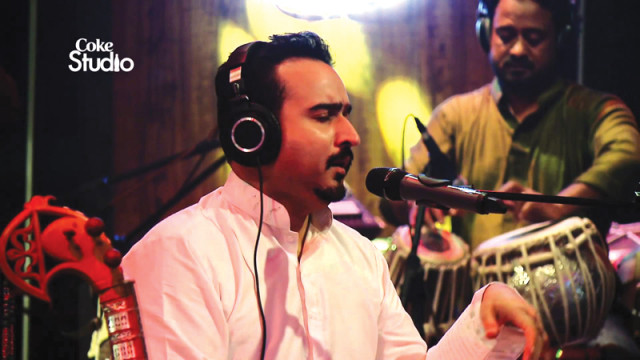From Sun Re to Coke Studio
Abbas Ali Khan on his latest album Tamaam Alam Mast and how he transitioned into becoming a household name in music

Singer-songwriter Abbas Ali Khan’s work embodies a combination of devotional music paired with articulate expression. After beginning his musical journey nearly a decade ago with the album Sun Re (2006), he has now drifted towards creating Sufi music, something that has garnered him an even greater fan-following. Abbas, who marked his Coke Studio debut with the song Mujhe Baar Baar this year, speaks to The Express Tribune about his latest album Tamaam Alam Mast and how he became a household name in music.
“Tamaam Alam Mast contains devotional influences from Baba Gulzar Sabri to Khusrow,” says Abbas. He finds nothing wrong with the emerging trend of Sufi music being considered as a ‘cool’ way of pivoting the new generations towards spirituality. Abbas credits his success to Ustad Fateh Ali Khan, who has guided him throughout his tryst with music. “My guru Ustad Fateh Ali Khan has been an exception in this regard. He taught me whatever I could absorb, which is why I was able to bridge intuition with influence,” he says.

With over 200,000 hits for his song Mujhe Baar Baar, Abbas says, “Coke Studio is perhaps the only platform that brings a musician to the spotlight.” Having been a part of the production process, Abbas brought about a few changes in the seventh instalment of the show. “This was more a celebratory season, a tribute to the legends of Pakistani music. We wanted to bring forth elements of nostalgia. I incorporated [the show’s producers] Bilal Maqsood and Faisal Kapadia’s philosophy into not only the SMD graphics but also the on-screen motion graphics,” he states.
Abbas shares that he likes to work at his own pace, which is why his fans get to see and hear little of him. “I’m not gregarious and live in my own bubble and work at my own ease. I’m bad at keeping track of the pace of our music scene,” he comments.
On what music means to him, he says, “Music is a tricky profession in Pakistan. I never intended to win bread through it. For me, it is a mode of expression and ventilation, one of the many mediums for an artiste like me.” He adds, “Pakistani fans have an ear for good music and have become more welcoming over the time. Music is art and art without purpose will continue to leave fans unimpressed.”
Abbas feels that the prevailing issue of piracy has become a back-breaker for artistes in the country. “I poured my heart and soul into Tamaam Alam Mast and never intended to focus on its commercial value,” he says. “Piracy is something yet to be understood by the masses as a wrongdoing. I planned to release my album on online platforms and requested my audience to support me in the cause against plagiarism. So far, I’ve sold 1,500 copies of the new album,” he adds.

Although Abbas acknowledges that every artiste wants acclaim, he holds that putting heart and soul into what one believes in brings commercial value to the product by itself. “I don’t follow anyone’s league. I prefer making my own,” he remarks. For Abbas, the Pakistani music scene cannot be deemed an ‘industry’ because an industry generates revenue. He feels that apart from a few mainstream artistes, who earn their bread and butter through stints in Bollywood, others struggle to make ends meet. He believes that the revival of cinema is the only beacon of hope at present.
Published in The Express Tribune, December 2nd, 2014.
Like Life & Style on Facebook, follow @ETLifeandStyle on Twitter for the latest in fashion, gossip and entertainment.



















COMMENTS
Comments are moderated and generally will be posted if they are on-topic and not abusive.
For more information, please see our Comments FAQ